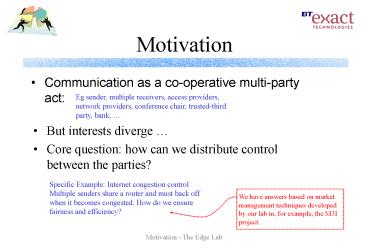Motivation - PowerPoint PPT Presentation
Title: Motivation
1
Motivation
- Communication as a co-operative multi-party act
Eg sender, multiple receivers, access providers,
network providers, conference chair,
trusted-third party, bank,
- But interests diverge
- Core question how can we distribute control
between the parties?
Specific Example Internet congestion
control Multiple senders share a router and must
back off when it becomes congested. How do we
ensure fairness and efficiency?
We have answers based on market management
techniques developed by our lab in, for example,
the M3I project.
2
Current Work
- Two specific projects
- MMAPPS
- Innovative middleware to motivate fuller
participation in P2P services. - Stimulating routing in ad-hoc networks
- Multi-hop, multi-owner networks require
lightweight mechanisms to stimulate nodes to
contribute
3
MMAPPS
- EU funded 5th Framework project
- 7 partners
- BT Lead
MYSTERIAN
http//www.mmapps.org/
4
Markets and Peer-to-Peer
- P2P services exhibit the distributed control
problem
Who controls the discussion?
Why should I share my files?
Free-riding
Groove collaboration software
Gnutella
Others have looked at free-riding Only generic
solution proposed so far
Free Markets
- Too heavyweight
- Market Failures
and not very P2P!
5
Approach
- Look at the real world
- social interactions, reputation, evolution and
psychology of co-operation. - Mutual enforcement of rules within co-operative
communities of peers - Rules may supplement markets for fair exchange
6
Example scenario
- P2P-based Local Newspaper
Rules relate to both service and resource
contributions
Example service contribution
Authors receive financial remuneration and
enhanced reputations according to the number of
'posts' and their associated ratings
- At the end of each month 1/12th of the kitty is
allocated to authors in proportion to their total
article rating. - Each month your reputation increases by the
average of the rating of the articles you
submitted that month.
Example resource contribution
Everyone should contribute resources during
searches and remain usually online.
- You must answer 80 of the search queries, and
50 of the content requests addressed to you - A consensus (gt70) of complaints causes
expulsion.
7
Scenario II
- Peer WLAN
- community of peer WLAN administrative domains
- roaming between peer domains
- better geographical coverage than any peer
- users within a domain may form their own
community rules
- Example consortium rules
- if domain prevents roamers, its users denied
roaming - excessive misbehaving users in one domain denies
roaming to all users from that domain































